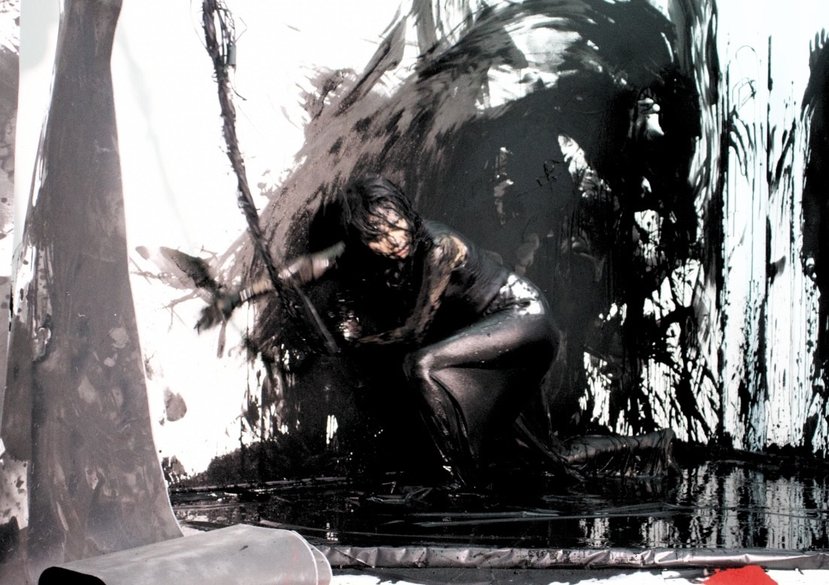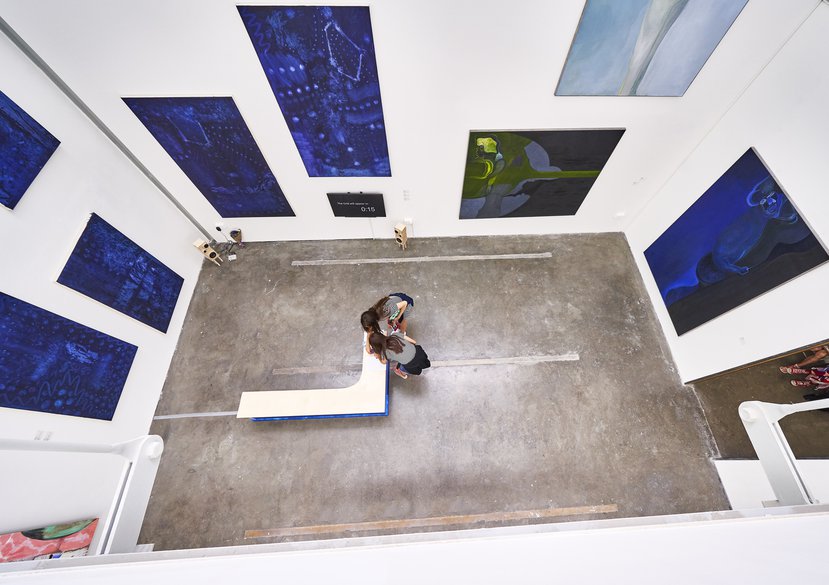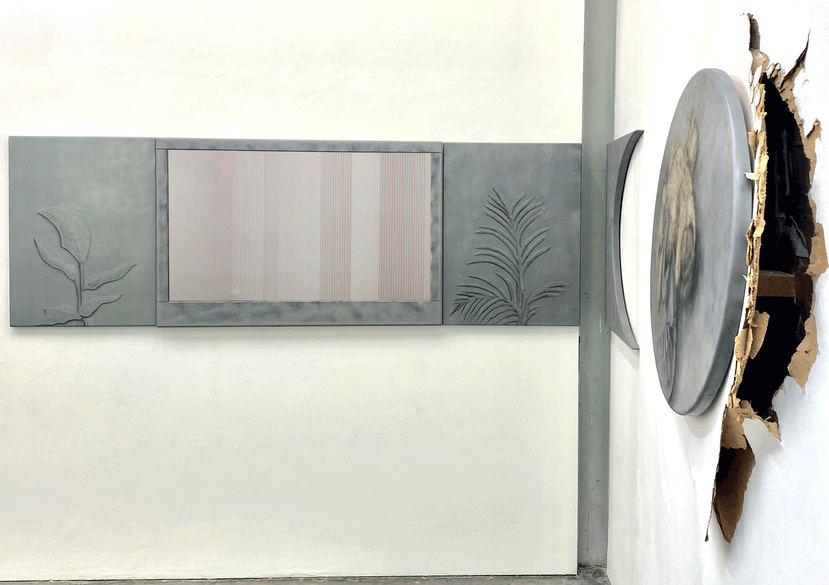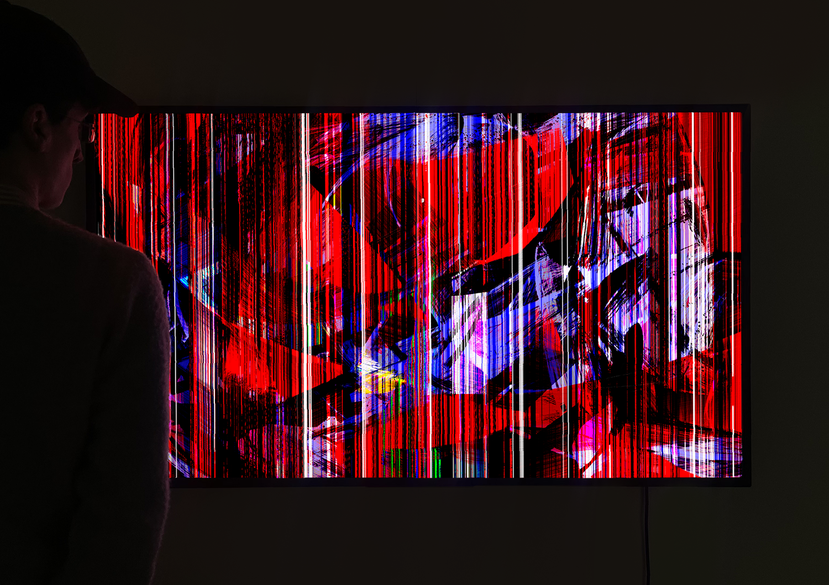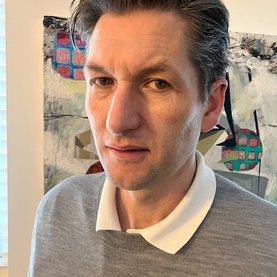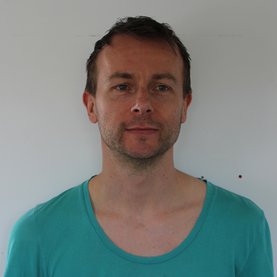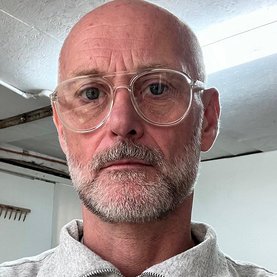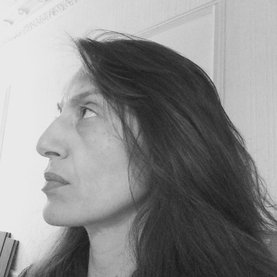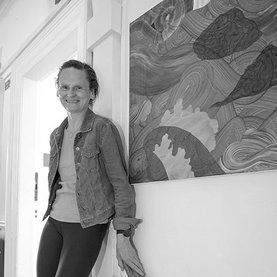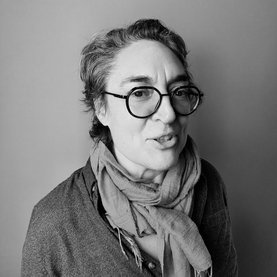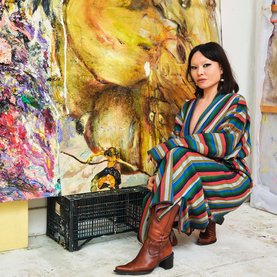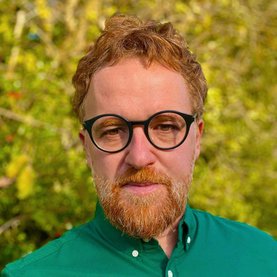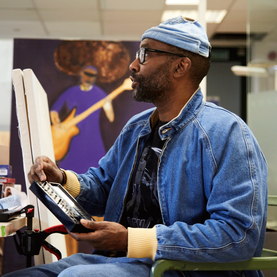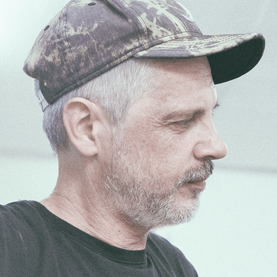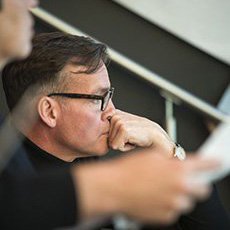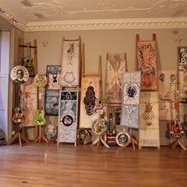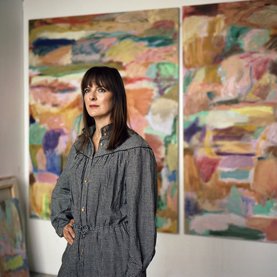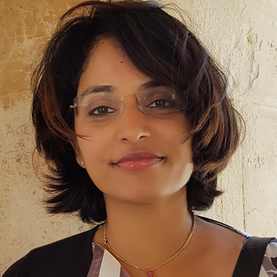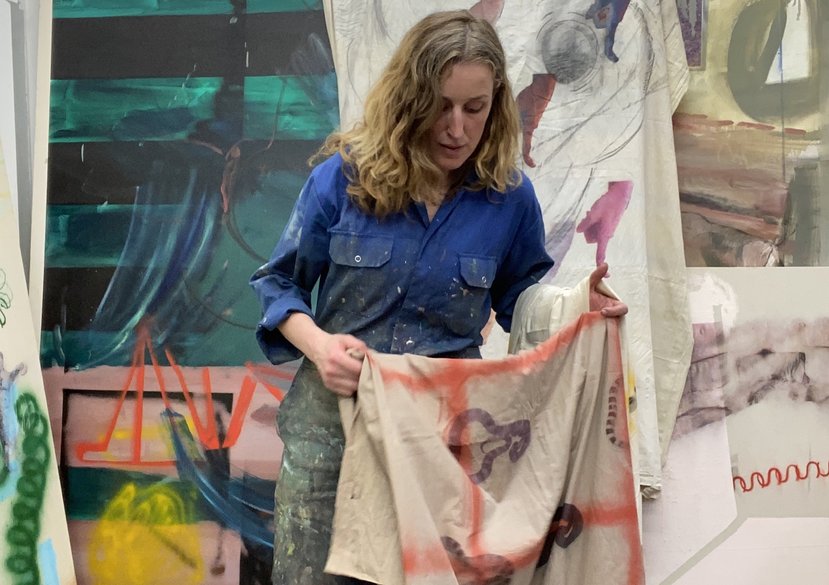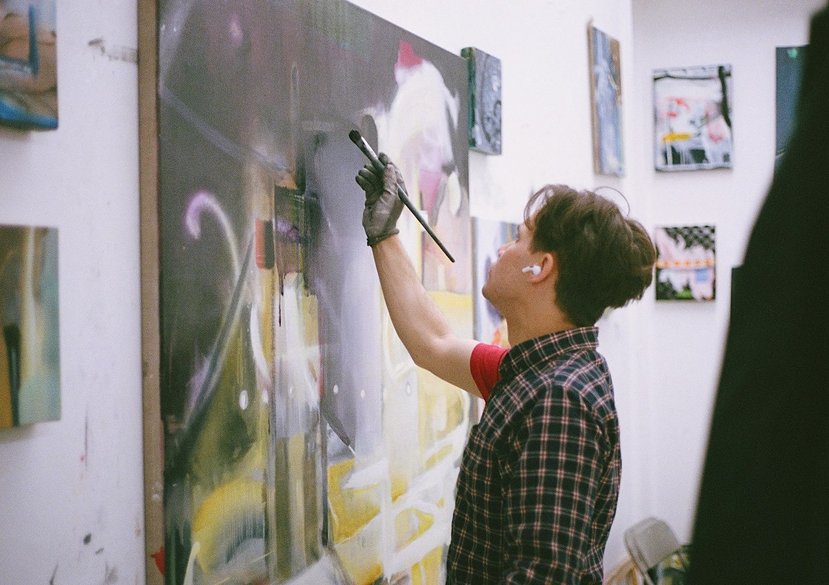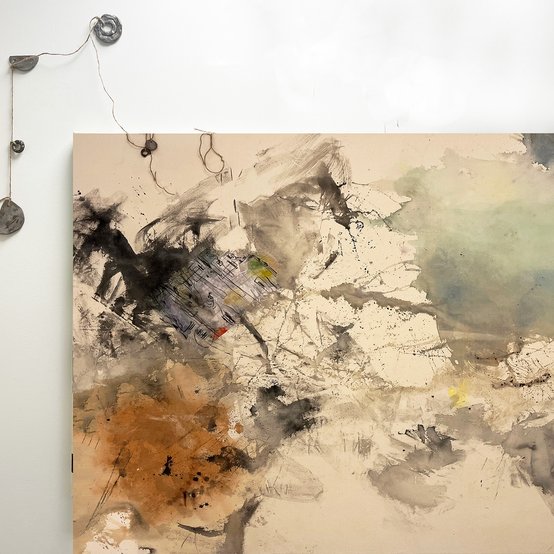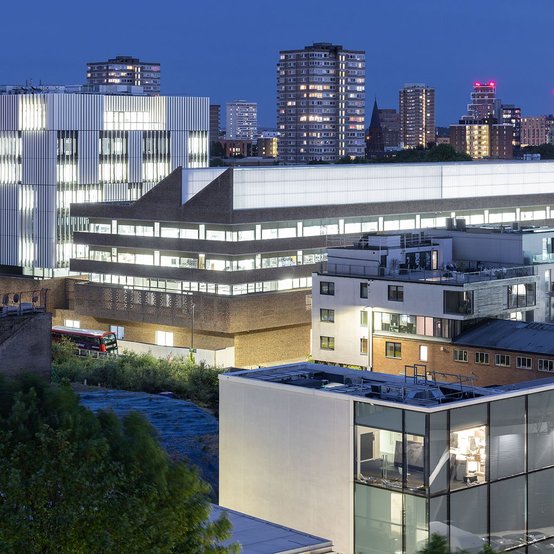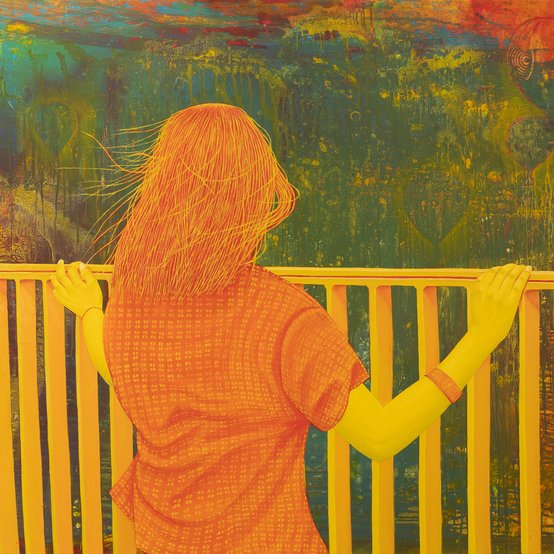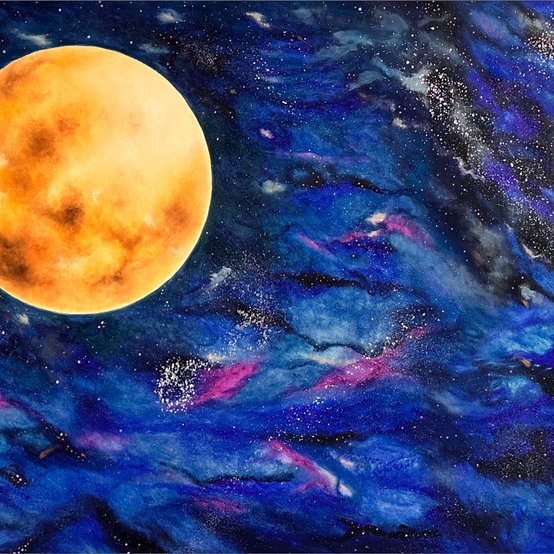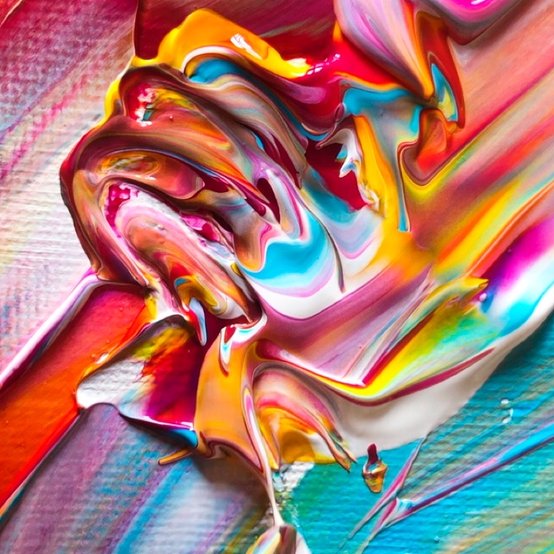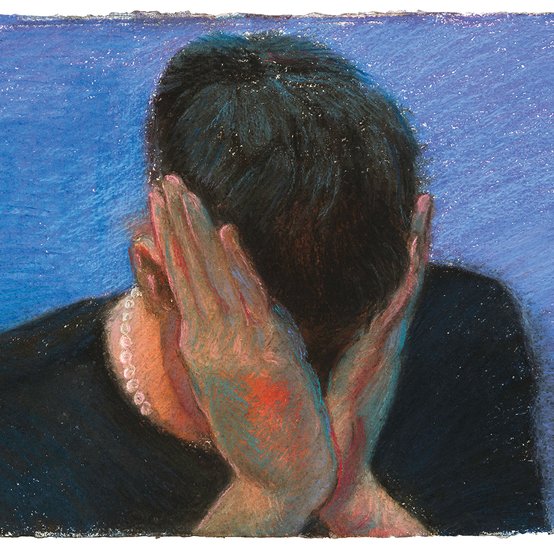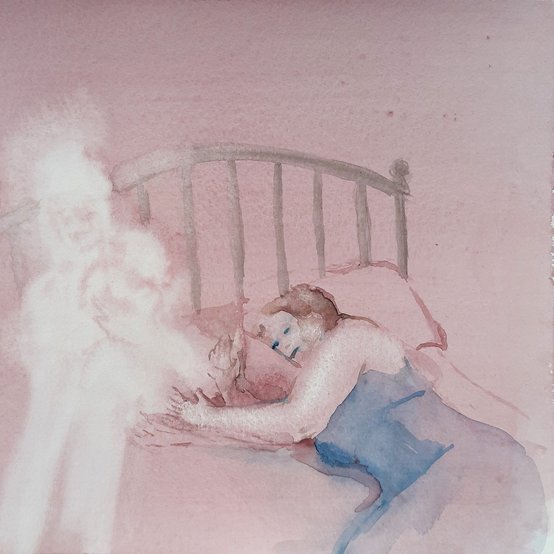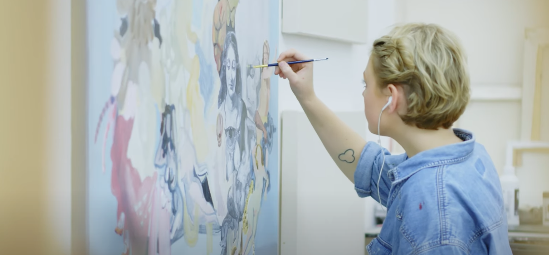
Overview
Inclusive, expansive, future-facing
Key details
- 180 credits
- 1 year / 45 week programme
- Full-time study
School or Centre
Current location
- Battersea
Next open event
- 6 May 2025
- Join next Online Q&A Week
Round 2 application deadline
- 30 Jun 2025
Interrogate the meanings, forms and futures of painting in the contemporary world
At the RCA, we cultivate an inclusive and expansive approach to painting, as both a material practice and a way of thinking.
Our innovative teaching fosters the development of creative, self-reflective and critical artists. We cultivate these values through a collaborative culture engaged with current global issues. You will embrace painting’s rich material and conceptual histories and its potentials in the 21st century in today’s diverse transnational and intercultural contexts.
You will benefit from studying on a world-renowned postgraduate programme dedicated to painting, enabling an intensive and focused learning experience. We provide opportunities for you to advance your studio practice through expert teaching and specialist facilities, within a vibrant, international community of students, faculty, and visiting experts. You will be supported by a committed team of tutors as you learn through individual tutorials, group critiques, seminars, and lectures. Informed by the perspectives of your peers, faculty, and invited contributors, you will refine your ability to reflect critically on your work.
Our teaching staff comprises accomplished artists and academics of international standing who work across a diverse range of subjects and media. We are committed to supporting your artistic and professional practice, and enabling you to flourish as independent artists, researchers and thinkers.
Catch the replays from our latest online Open Day.
Gallery
Staff
Facilities
The School of Arts & Humanities is located across our Battersea and Kensington sites.
View all facilitiesAll full-time students on fine or applied arts programmes are provided with studios or workspace, and access to specialist workshops. There are a number of bookable seminar and project spaces across the site available to all Arts & Humanities students.
Our alumni
Our alumni form an international network of creative individuals who have shaped and continue to shape the world. Click on each name to find out more.
Where will the RCA take you?- Hurvin Anderson
- Frank Auerbach
- Peter Blake
- Frank Bowling
- Gillian Carnegie
- Lu Chao
- Monster Chetwynd
- Jake and Dinos Chapman
- Dexter Dalwood
- Tracey Emin
- Jade Fadojutimi
- Emma Fineman
- Anthea Hamilton
- David Hockney
- Leon Kossoff
- Suki Seokyeong Kang
- Katy Moran
- Ryan Mosley
- Oscar Murillo
- Chris Ofili
- Bridget Riley
- George Shaw
- Vivien Zhang
More details on what you'll study.
Find out what you'll cover in this programme.
What you'll cover
Programme structure
Term 1
Establishing a Painting Practice (45 credits)
In this unit, you will gain an understanding of what informs the content, subject matter, form and execution of your work as well as establish the audio, visual and material research that feeds your work and practice. This unit will begin with a series of technical inductions, artist lectures and seminars presented by painting faculty to help you establish and orient your practice within the broader painting field. Establishing a Painting Practice supports you as you produce work, locate their work within a critical context while reflecting on historical and contemporary approaches to painting, ultimately leading to the development of an innovative individual practice. Additionally, you achieve this through curricular content in the form of seminars, workshops, individual tutorials, group critiques and off-site visits.
Terms 1&2
AcrossRCA (College-wide unit, 30 credits)
Across terms 1 and 2, you will participate in AcrossRCA. This unit aims to support you to meet the challenges of a complex, uncertain and changing world by bringing you together to work collaboratively in cross-programme interdisciplinary teams. In your team you will develop a self-initiated themed project, informed by expertise within and beyond the College. These projects will challenge you to collectively use your intellect and imagination to address key cultural, social, environmental and economic challenges. In doing so, you will develop and reflect on the abilities required to translate knowledge into action, and help demonstrate the contribution that the creative arts can make to our understanding and experience of the world.
Term 2
Painting in the Expanded Field: Experimental Positions (30 credits)
In this unit, you further examine and challenge the conceptual, aesthetic and material approaches to making that you developed in unit 1. The goal of this unit is to encourage you to deepen your understanding of the future direction of your practice with an interdisciplinary focus on experimentation, execution and critical reflection. You will produce finished work at an advanced level and explore various modes of presenting. The end of this unit will culminate in a presentation and a written proposal for your IRP in preparation for the degree show presentation of your work in unit 3.
Urgency of the Arts (School-wide unit, 15 credits)
In term 2, School of Arts and Humanities Masters’ students will participate in a School-wide unit called "The Urgency of the Arts." In this unit we ask how arts and humanities research and practice can engage with our current socio-political climate, and how might it shape, be necessary and essential in contemporary cultural debates.
The unit introduces you to a diverse range of perspectives, approaches and methods relevant to contemporary practice and thought in the arts and humanities. The delivery, predominantly based on workshops and featuring specialist presentations by leading artists, aims to assist you in recognising, questioning, expanding, and reevaluating your own artistic practices and disciplinary assumptions. Through interactions with staff and students from across the School, as well as through a variety of methodological approaches, you will develop an understanding of the contemporary concerns that shape and influence artistic practice. You will be encouraged to reflect on these as a means to articulate the potential of your own work within the context of broad cultural landscapes and urgent cultural debates.
Term 3
Independent Research Project - IRP (60 credits)
The 60-credit Independent Research Project (IRP) is an opportunity to build a body of work that addresses the key ambitions of your research and practice. You will work towards presenting a work or works in the IRP public exhibition, which enables you to explore how you can activate your work in a public context, experiment with the most appropriate forms of realising your ideas and gain critical feedback. The IRP exhibition takes place mid-way through the unit and will be followed by a period of reflection and further development, which emphasises planning for continued practice and research post-graduation.
The programme approaches the IRP as self-directed study centred on an assessed presentation of your work as an exhibition, a publication and a research essay.
This MA is delivered over 45 weeks.
AcrossRCA
AcrossRCA is a compulsory 30-credit unit which is delivered as part of all MA programmes.
Situated at the core of your RCA experience, this ambitious interdisciplinary College-wide unit supports you in responding to the challenges of complex, uncertain and changing physical and digital worlds. Developed in response to student feedback, AcrossRCA creates an exciting opportunity for you to collaborate meaningfully across programmes.
Challenging you to use your imagination and intellect to respond to urgent contemporary themes, this ambitious unit will provide you with the opportunity to:
- make connections across disciplines
- think critically about your creative practice
- develop creative networks within and beyond the College
- generate innovative responses to complex problems
- reflect on how to propose ideas for positive change in local and/or global contexts
AcrossRCA launches with a series of presentations and panel discussions from acclaimed speakers who will introduce the themes and act as inspirational starting points for your collaborative team response.
Delivered online and in-person across two terms, the unit has been designed to complement your disciplinary studies and to provide you with a platform to thrive beyond graduation.
Requirements
What you need to know before you apply
Candidates are selected entirely on merit and applications are welcomed from all over the world. The selection process will consider creativity, imagination and innovation as demonstrated in your portfolio, and your potential to benefit from the programme to achieve high MA standards. We are looking for candidates who are highly motivated, independent and can demonstrate they have the critical skills necessary to advance their practice in a rigorous and challenging environment.
Typically, our students will have a good BA (Undergraduate) Fine Art degree, however we welcome applications from candidates with other backgrounds. In recent years, students have come from fine art, painting, printmaking, sculpture, photo media, conservation, illustration, design, textiles, architecture, art history and interactive arts courses. While many students enter the course after a period of independent work, we also accept students directly from undergraduate courses.
What's needed from you
Portfolio requirements
You have one slot which can accept one PDF file. From this we hope to understand:
- How you approach the conception and making of your work
- How you position your work in a contemporary context
- What are the key issues, concerns and themes that you explore in your work
The portfolio should include a ‘portfolio statement’ about your work (maximum 200 words) that addresses the above points, and documentation of your work. (Please note this statement is separate to the ‘statement of intent’ that all applicants submit within the online portal.)
Include at least 10–15 images of your work, with a maximum of 15 pages total. You should focus on finished work, but you may also show working processes. Please include the title, date, dimensions, and material/media of each work. Remember, we will be viewing the document on screen, so consider your layout with this in mind. Video/media files can be embedded (no more than 2 x 1-minute clips).
We are looking at how you curate a refined, concise portfolio that best represents your practice to date. Your portfolio should express who you are as an artist and indicate your potential.
Personal statement
Please provide a 300-word written personal statement that addresses the following points:
- Introduce yourself, your interests and your motivations for applying to the Royal College of Art, and to this programme in particular.
- Briefly summarise any educational background and professional experience to date that will support your application.
- Tell us what you want to do in the future.
Video requirements
We ask that you upload a two-minute video recorded on your phone or laptop, speaking to us directly.
This two-minute video gives you the opportunity to introduce yourself to us as an artist and present a clear and concise overview of your work, expanding on the statement and images in your portfolio. Please record yourself speaking to us directly. The recording can be via your phone or laptop. High production qualities are not needed as we will be reviewing your work in your portfolio.
We are keen to learn:
- How are you beginning to define your work and painting practice?
- What feeds your practice and the choices you make about content, concept, form and execution?
- What research informs your work and practice?
- Why do you want to join the RCA Painting programme?
English-language requirements
If you are not a national of a majority English-speaking country you will need the equivalent of an IELTS Academic or UKVI score of 6.5 with a 6.0 in the Test of Written English (TWE) and at least 5.5 in other skills. Students achieving a grade of at least 6.0, with a grade of 5.5 in the Test of Written English, may be eligible to take the College’s English for Academic Purposes course to enable them to reach the required standard.
You are exempt from this requirement if you have received a 2.1 degree or above from a university in a majority English-speaking nation within the last five years.
If you need a Student Visa to study at the RCA, you will also need to meet the Home Office’s minimum requirements for entry clearance.
Fees & funding
For this programme
Fees for new students
Fees for September 2025 entry on this programme are outlined below. From 2021 onward, EU students are classified as Overseas for tuition fee purposes.
Home
Overseas and EU
Deposit
New entrants to the College will be required to pay a non-refundable deposit in order to secure their place. This will be offset against the tuition fees.
Home
Overseas and EU
Progression discount
For alumni and students who have completed an RCA Graduate Diploma and progress onto an RCA MA programme, a progression discount of £1,000 is available.
* Total cost is based on the assumption that the programme is completed in the timeframe stated in the programme details. Additional study time may incur additional charges.
Scholarships
Scholarships
The RCA scholarship programme is growing, with hundreds of financial awards planned for the 2025/6 academic year.
For more information and examples of financial awards offered in 2024/25, visit the Scholarships & awards webpage.
You must hold an offer to study on an RCA programme in order to make a scholarship application in Spring 2024. A selection of RCA merit scholarships will also be awarded with programme offers.
We strongly recommend that you apply for your programme as early as possible to stand the best chance of receiving a scholarship. You do not apply directly for individual awards; instead, you will be invited to apply once you have received an offer.
More information
Additional fees
In addition to your programme fees, please be aware that you may incur other additional costs associated with your study during your time at RCA. Additional costs can include purchases and services (without limitation): costs related to the purchase of books, paints, textiles, wood, metal, plastics and/or other materials in connection with your programme, services related to the use of printing and photocopying, lasercutting, 3D printing and CNC. Costs related to attending compulsory field trips, joining student and sport societies, and your Convocation (graduation) ceremony.
If you wish to find out more about what type of additional costs you may incur while studying on your programme, please contact the Head of your Programme to discuss or ask at an online or in person Open Day.
We provide the RCASHOP online, and at our Kensington and Battersea Campuses – this is open to students and staff of the Royal College of Art only to provide paid for materials to support your studies.
We also provide support to our students who require financial assistance whilst studying, including a dedicated Materials Fund.
External funding
There are many funding sources, with some students securing scholarships and others saving money from working. It is impossible to list all the potential funding sources; however, the following information could be useful.
Payments
Tuition fees are due on the first day of the academic year and students are sent an invoice prior to beginning their studies. Payments can be made in advance, on registration or in two instalments.
Start your application
Change your life and be here in 2025. Applications now open.
The Royal College of Art welcomes applicants from all over the world.
Before you begin
Make sure you've read and understood the entrance requirements
Visit the requirements pageCheck you have all the information you need to apply.
Read our application process guideConsider attending an Open Day, or one of our portfolio or application advice sessions.
See upcoming sessionsPlease note, all applications must be submitted by 12 noon on the given deadline.
Ask a question
Get in touch if you’d like to find out more or have any questions.

